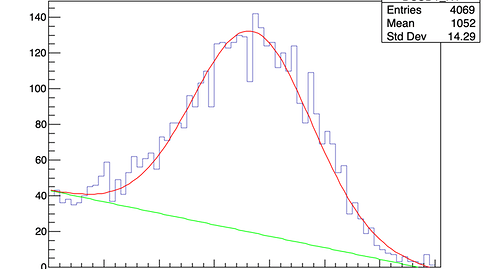Thats exactly the output I want! T.T
I’m using M1 Mac with mambaforge installed and root as conda-forge package. Here you have the versions of root that I get from conda list:
I’m running it in python 3.9.1 shell.
This is the error I have when I run exactly the same script that I uploaded before:
Program started at: 14:13:38
File readed
Creating empty histograms:
100%|███████████████████████████████████████████████████████████████| 32/32 [00:00<00:00, 3939.35it/s]
OK Empty histograms created
Getting histograms from histos.root
100%|█████████████████████████████████████████████████████████████████| 32/32 [00:00<00:00, 94.78it/s]
OK New histos get from histos.root
Finding peaks on each histogram
0%| | 0/32 [00:00<?, ?it/s]Info in <TCanvas::MakeDefCanvas>: created default TCanvas with name c1
3%|██ | 1/32 [00:00<00:12, 2.40it/s]TSpectrum::SearchHighRes:0: RuntimeWarning: Peak buffer full
12%|████████▎ | 4/32 [00:00<00:08, 3.31it/s]TSpectrum::SearchHighRes:0: RuntimeWarning: Peak buffer full
100%|█████████████████████████████████████████████████████████████████| 32/32 [00:01<00:00, 30.23it/s]
OK All peaks have been found
Calculating peaks positions with gaussian fitting
0%| | 0/8 [00:00<?, ?it/s] *** Break *** segmentation violation
[/Users/vicentegt/mambaforge/lib/libCore.6.22.06.so] TUnixSystem::DispatchSignals(ESignals) (no debug info)
[/usr/lib/system/libsystem_platform.dylib] _sigtramp (no debug info)
[/Users/vicentegt/mambaforge/lib/libCling.6.22.06.so] llvm::RuntimeDyldMachOAArch64::processRelocationRef(unsigned int, llvm::object::content_iterator<llvm::object::RelocationRef>, llvm::object::ObjectFile const&, std::__1::map<llvm::object::SectionRef, unsigned int, std::__1::less<llvm::object::SectionRef>, std::__1::allocator<std::__1::pair<llvm::object::SectionRef const, unsigned int> > >&, std::__1::map<llvm::RelocationValueRef, unsigned long, std::__1::less<llvm::RelocationValueRef>, std::__1::allocator<std::__1::pair<llvm::RelocationValueRef const, unsigned long> > >&) (no debug info)
[/Users/vicentegt/mambaforge/lib/libCling.6.22.06.so] llvm::RuntimeDyldImpl::loadObjectImpl(llvm::object::ObjectFile const&) (no debug info)
[/Users/vicentegt/mambaforge/lib/libCling.6.22.06.so] llvm::RuntimeDyldMachO::loadObject(llvm::object::ObjectFile const&) (no debug info)
[/Users/vicentegt/mambaforge/lib/libCling.6.22.06.so] llvm::RuntimeDyld::loadObject(llvm::object::ObjectFile const&) (no debug info)
[/Users/vicentegt/mambaforge/lib/libCling.6.22.06.so] llvm::orc::RTDyldObjectLinkingLayer::ConcreteLinkedObject<std::__1::shared_ptr<llvm::RuntimeDyld::MemoryManager>, std::__1::shared_ptr<llvm::JITSymbolResolver>, llvm::orc::RTDyldObjectLinkingLayer::addObject(std::__1::shared_ptr<llvm::object::OwningBinary<llvm::object::ObjectFile> >, std::__1::shared_ptr<llvm::JITSymbolResolver>)::'lambda'(std::__1::__list_iterator<std::__1::unique_ptr<llvm::orc::RTDyldObjectLinkingLayerBase::LinkedObject, std::__1::default_delete<llvm::orc::RTDyldObjectLinkingLayerBase::LinkedObject> >, void*>, llvm::RuntimeDyld&, std::__1::shared_ptr<llvm::object::OwningBinary<llvm::object::ObjectFile> > const&, std::__1::function<void ()>)>::finalize() (no debug info)
[/Users/vicentegt/mambaforge/lib/libCling.6.22.06.so] llvm::orc::RTDyldObjectLinkingLayer::ConcreteLinkedObject<std::__1::shared_ptr<llvm::RuntimeDyld::MemoryManager>, std::__1::shared_ptr<llvm::JITSymbolResolver>, llvm::orc::RTDyldObjectLinkingLayer::addObject(std::__1::shared_ptr<llvm::object::OwningBinary<llvm::object::ObjectFile> >, std::__1::shared_ptr<llvm::JITSymbolResolver>)::'lambda'(std::__1::__list_iterator<std::__1::unique_ptr<llvm::orc::RTDyldObjectLinkingLayerBase::LinkedObject, std::__1::default_delete<llvm::orc::RTDyldObjectLinkingLayerBase::LinkedObject> >, void*>, llvm::RuntimeDyld&, std::__1::shared_ptr<llvm::object::OwningBinary<llvm::object::ObjectFile> > const&, std::__1::function<void ()>)>::getSymbolMaterializer(std::__1::basic_string<char, std::__1::char_traits<char>, std::__1::allocator<char> >)::'lambda'()::operator()() const (no debug info)
[/Users/vicentegt/mambaforge/lib/libCling.6.22.06.so] llvm::orc::LazyEmittingLayer<llvm::orc::IRCompileLayer<cling::IncrementalJIT::RemovableObjectLinkingLayer, llvm::orc::SimpleCompiler> >::EmissionDeferredModule::find(llvm::StringRef, bool, llvm::orc::IRCompileLayer<cling::IncrementalJIT::RemovableObjectLinkingLayer, llvm::orc::SimpleCompiler>&)::'lambda'()::operator()() const (no debug info)
[/Users/vicentegt/mambaforge/lib/libCling.6.22.06.so] cling::IncrementalJIT::getSymbolAddress(std::__1::basic_string<char, std::__1::char_traits<char>, std::__1::allocator<char> > const&, bool) (no debug info)
[/Users/vicentegt/mambaforge/lib/libCling.6.22.06.so] cling::IncrementalExecutor::getAddressOfGlobal(llvm::StringRef, bool*) const (no debug info)
[/Users/vicentegt/mambaforge/lib/libcppyy3_9.6.22.06.so] PyFunction_AsCPointer(_object*, std::__1::basic_string<char, std::__1::char_traits<char>, std::__1::allocator<char> > const&, std::__1::basic_string<char, std::__1::char_traits<char>, std::__1::allocator<char> > const&) (no debug info)
[/Users/vicentegt/mambaforge/lib/libcppyy3_9.6.22.06.so] CPyCppyy::(anonymous namespace)::FunctionPointerConverter::SetArg(_object*, CPyCppyy::Parameter&, CPyCppyy::CallContext*) (no debug info)
[/Users/vicentegt/mambaforge/lib/libcppyy3_9.6.22.06.so] CPyCppyy::CPPMethod::ConvertAndSetArgs(_object*, CPyCppyy::CallContext*) (no debug info)
[/Users/vicentegt/mambaforge/lib/libcppyy3_9.6.22.06.so] CPyCppyy::CPPConstructor::Call(CPyCppyy::CPPInstance*&, _object*, _object*, CPyCppyy::CallContext*) (no debug info)
[/Users/vicentegt/mambaforge/lib/libcppyy3_9.6.22.06.so] CPyCppyy::(anonymous namespace)::mp_call(CPyCppyy::CPPOverload*, _object*, _object*) (no debug info)
[/Users/vicentegt/mambaforge/lib/libcppyy3_9.6.22.06.so] CPyCppyy::tpp_call(CPyCppyy::TemplateProxy*, _object*, _object*) (no debug info)
[/Users/vicentegt/mambaforge/bin/python] _PyObject_Call (no debug info)
[/Users/vicentegt/mambaforge/bin/python] slot_tp_init (no debug info)
[/Users/vicentegt/mambaforge/bin/python] type_call (no debug info)
[/Users/vicentegt/mambaforge/bin/python] _PyObject_MakeTpCall (no debug info)
[/Users/vicentegt/mambaforge/bin/python] call_function (no debug info)
[/Users/vicentegt/mambaforge/bin/python] _PyEval_EvalFrameDefault (no debug info)
[/Users/vicentegt/mambaforge/bin/python] _PyEval_EvalCode (no debug info)
[/Users/vicentegt/mambaforge/bin/python] _PyFunction_Vectorcall (no debug info)
[/Users/vicentegt/mambaforge/bin/python] call_function (no debug info)
[/Users/vicentegt/mambaforge/bin/python] _PyEval_EvalFrameDefault (no debug info)
[/Users/vicentegt/mambaforge/bin/python] _PyEval_EvalCode (no debug info)
[/Users/vicentegt/mambaforge/bin/python] PyRun_FileExFlags (no debug info)
[/Users/vicentegt/mambaforge/bin/python] PyRun_SimpleFileExFlags (no debug info)
[/Users/vicentegt/mambaforge/bin/python] Py_RunMain (no debug info)
[/Users/vicentegt/mambaforge/bin/python] pymain_main (no debug info)
[/Users/vicentegt/mambaforge/bin/python] main (no debug info)
[/usr/lib/system/libdyld.dylib] start (no debug info)
*** Break *** segmentation violation
[/Users/vicentegt/mambaforge/lib/libCore.6.22.06.so] TUnixSystem::DispatchSignals(ESignals) (no debug info)
[/usr/lib/system/libsystem_platform.dylib] _sigtramp (no debug info)
[/Users/vicentegt/mambaforge/lib/libCling.6.22.06.so] llvm::RuntimeDyldMachOAArch64::processRelocationRef(unsigned int, llvm::object::content_iterator<llvm::object::RelocationRef>, llvm::object::ObjectFile const&, std::__1::map<llvm::object::SectionRef, unsigned int, std::__1::less<llvm::object::SectionRef>, std::__1::allocator<std::__1::pair<llvm::object::SectionRef const, unsigned int> > >&, std::__1::map<llvm::RelocationValueRef, unsigned long, std::__1::less<llvm::RelocationValueRef>, std::__1::allocator<std::__1::pair<llvm::RelocationValueRef const, unsigned long> > >&) (no debug info)
[/Users/vicentegt/mambaforge/lib/libCling.6.22.06.so] llvm::RuntimeDyldImpl::loadObjectImpl(llvm::object::ObjectFile const&) (no debug info)
[/Users/vicentegt/mambaforge/lib/libCling.6.22.06.so] llvm::RuntimeDyldMachO::loadObject(llvm::object::ObjectFile const&) (no debug info)
[/Users/vicentegt/mambaforge/lib/libCling.6.22.06.so] llvm::RuntimeDyld::loadObject(llvm::object::ObjectFile const&) (no debug info)
[/Users/vicentegt/mambaforge/lib/libCling.6.22.06.so] llvm::orc::RTDyldObjectLinkingLayer::ConcreteLinkedObject<std::__1::shared_ptr<llvm::RuntimeDyld::MemoryManager>, std::__1::shared_ptr<llvm::JITSymbolResolver>, llvm::orc::RTDyldObjectLinkingLayer::addObject(std::__1::shared_ptr<llvm::object::OwningBinary<llvm::object::ObjectFile> >, std::__1::shared_ptr<llvm::JITSymbolResolver>)::'lambda'(std::__1::__list_iterator<std::__1::unique_ptr<llvm::orc::RTDyldObjectLinkingLayerBase::LinkedObject, std::__1::default_delete<llvm::orc::RTDyldObjectLinkingLayerBase::LinkedObject> >, void*>, llvm::RuntimeDyld&, std::__1::shared_ptr<llvm::object::OwningBinary<llvm::object::ObjectFile> > const&, std::__1::function<void ()>)>::finalize() (no debug info)
[/Users/vicentegt/mambaforge/lib/libCling.6.22.06.so] llvm::orc::RTDyldObjectLinkingLayer::ConcreteLinkedObject<std::__1::shared_ptr<llvm::RuntimeDyld::MemoryManager>, std::__1::shared_ptr<llvm::JITSymbolResolver>, llvm::orc::RTDyldObjectLinkingLayer::addObject(std::__1::shared_ptr<llvm::object::OwningBinary<llvm::object::ObjectFile> >, std::__1::shared_ptr<llvm::JITSymbolResolver>)::'lambda'(std::__1::__list_iterator<std::__1::unique_ptr<llvm::orc::RTDyldObjectLinkingLayerBase::LinkedObject, std::__1::default_delete<llvm::orc::RTDyldObjectLinkingLayerBase::LinkedObject> >, void*>, llvm::RuntimeDyld&, std::__1::shared_ptr<llvm::object::OwningBinary<llvm::object::ObjectFile> > const&, std::__1::function<void ()>)>::getSymbolMaterializer(std::__1::basic_string<char, std::__1::char_traits<char>, std::__1::allocator<char> >)::'lambda'()::operator()() const (no debug info)
[/Users/vicentegt/mambaforge/lib/libCling.6.22.06.so] llvm::orc::LazyEmittingLayer<llvm::orc::IRCompileLayer<cling::IncrementalJIT::RemovableObjectLinkingLayer, llvm::orc::SimpleCompiler> >::EmissionDeferredModule::find(llvm::StringRef, bool, llvm::orc::IRCompileLayer<cling::IncrementalJIT::RemovableObjectLinkingLayer, llvm::orc::SimpleCompiler>&)::'lambda'()::operator()() const (no debug info)
[/Users/vicentegt/mambaforge/lib/libCling.6.22.06.so] cling::IncrementalJIT::getSymbolAddress(std::__1::basic_string<char, std::__1::char_traits<char>, std::__1::allocator<char> > const&, bool) (no debug info)
[/Users/vicentegt/mambaforge/lib/libCling.6.22.06.so] cling::IncrementalExecutor::getAddressOfGlobal(llvm::StringRef, bool*) const (no debug info)
[/Users/vicentegt/mambaforge/lib/libcppyy3_9.6.22.06.so] PyFunction_AsCPointer(_object*, std::__1::basic_string<char, std::__1::char_traits<char>, std::__1::allocator<char> > const&, std::__1::basic_string<char, std::__1::char_traits<char>, std::__1::allocator<char> > const&) (no debug info)
[/Users/vicentegt/mambaforge/lib/libcppyy3_9.6.22.06.so] CPyCppyy::(anonymous namespace)::FunctionPointerConverter::SetArg(_object*, CPyCppyy::Parameter&, CPyCppyy::CallContext*) (no debug info)
[/Users/vicentegt/mambaforge/lib/libcppyy3_9.6.22.06.so] CPyCppyy::CPPMethod::ConvertAndSetArgs(_object*, CPyCppyy::CallContext*) (no debug info)
[/Users/vicentegt/mambaforge/lib/libcppyy3_9.6.22.06.so] CPyCppyy::CPPConstructor::Call(CPyCppyy::CPPInstance*&, _object*, _object*, CPyCppyy::CallContext*) (no debug info)
[/Users/vicentegt/mambaforge/lib/libcppyy3_9.6.22.06.so] CPyCppyy::(anonymous namespace)::mp_call(CPyCppyy::CPPOverload*, _object*, _object*) (no debug info)
[/Users/vicentegt/mambaforge/lib/libcppyy3_9.6.22.06.so] CPyCppyy::tpp_call(CPyCppyy::TemplateProxy*, _object*, _object*) (no debug info)
[/Users/vicentegt/mambaforge/bin/python] _PyObject_Call (no debug info)
[/Users/vicentegt/mambaforge/bin/python] slot_tp_init (no debug info)
[/Users/vicentegt/mambaforge/bin/python] type_call (no debug info)
[/Users/vicentegt/mambaforge/bin/python] _PyObject_MakeTpCall (no debug info)
[/Users/vicentegt/mambaforge/bin/python] call_function (no debug info)
[/Users/vicentegt/mambaforge/bin/python] _PyEval_EvalFrameDefault (no debug info)
[/Users/vicentegt/mambaforge/bin/python] _PyEval_EvalCode (no debug info)
[/Users/vicentegt/mambaforge/bin/python] _PyFunction_Vectorcall (no debug info)
[/Users/vicentegt/mambaforge/bin/python] call_function (no debug info)
[/Users/vicentegt/mambaforge/bin/python] _PyEval_EvalFrameDefault (no debug info)
[/Users/vicentegt/mambaforge/bin/python] _PyEval_EvalCode (no debug info)
[/Users/vicentegt/mambaforge/bin/python] PyRun_FileExFlags (no debug info)
[/Users/vicentegt/mambaforge/bin/python] PyRun_SimpleFileExFlags (no debug info)
[/Users/vicentegt/mambaforge/bin/python] Py_RunMain (no debug info)
[/Users/vicentegt/mambaforge/bin/python] pymain_main (no debug info)
[/Users/vicentegt/mambaforge/bin/python] main (no debug info)
[/usr/lib/system/libdyld.dylib] start (no debug info)
(base) vicentegt@arm64-apple-darwin20:~/Downloads% /Users/vicentegt/mambaforge/lib/python3.9/multiprocessing/resource_tracker.py:216: UserWarning: resource_tracker: There appear to be 1 leaked semaphore objects to clean up at shutdown
warnings.warn('resource_tracker: There appear to be %d '


 ) taking a lot of your time to help me to solve that. I’m sorry.
) taking a lot of your time to help me to solve that. I’m sorry. Everything works
Everything works I get the error that I posted before.
I get the error that I posted before.